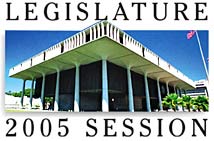Tax cuts unlikely
this session
GOP lawmakers say public
union pay raises are to blame
if taxpayers see no breaks this year
The state doesn't have enough money for tax cuts this year, and Republicans are blaming the public worker pay raises.
Adding it up
State's net costs from new contracts:
|
The new contracts are estimated to cost a total of $214.5 million more than was originally included in the budget, according to figures prepared by the Lingle administration.
Today the House and Senate will open conference committee meetings on bills to cut taxes in three ways: raise the standard deduction, add an earned income tax credit and expand the income tax brackets.
But the bills are not likely to survive, said Sen. Brian Taniguchi, Ways and Means chairman.
"We are going to open the conference, but it is not likely they are going to pass, because we don't have enough money," said Taniguchi (D, Moiliili-Manoa).
"Nothing is dead until the session is over, but we don't have a lot of money for any of them," he said.
While the full effect of the new state budget hasn't been tallied, Taniguchi said the state is likely to have only about $10 million to $15 million as a surplus for the 2006 fiscal year.
"If we have any more money left over, then we would want to look at funding some of the education items," Taniguchi said.
House Speaker Rep. Calvin Say (D, St. Louis Heights-Wilhemina Rise) said the fate of all three tax breaks is unclear.
"There may be one, there may be nothing. It all depends on how the conferees feel about each of the three different proposals," Say said.
State Tax Director Kurt Kawafuchi, who is backing the administration tax cut, said the state can afford the $30 million.
"If we increase the standard deduction, it would help 60 percent of the taxpayers in the state. Yes, we have included it in our budget and we can afford it," Kawafuchi said.
|
|
"There is one overwhelming special-interest group that dictates to state government, and that is the public worker unions," Hemmings said. "It looks like there is not going to be any tax relief."
"The money generated by increased tax collections because of the good economy has already been consumed by the unions," he added.
Gov. Linda Lingle had a similar analysis last week when she commented on the raise awarded to the Hawaii Government Employees Association through binding arbitration.
"We simply shouldn't be paying these types of raises. It isn't prudent and it doesn't make common or fiscal sense," Lingle said.
Randy Perreira, HGEA deputy executive director, said it is wrong to blame the unions for losing the tax breaks.
"There are a number of other things considered in the budget process. The legislators have their own initiatives. I think it would be unfair to pinpoint collective bargaining as the one thing," Perreira said.
Taniguchi said Lingle should reconsider her own bargaining style before blaming the unions.
"The governor says, 'This is terrible, we can't afford it, we are going broke and we won't be able to do anything,' and then she turns around and negotiates contracts (that) are higher than HGEA.
"You should be upfront and not complain about a particular union and then negotiate higher settlements with other unions," Taniguchi said.
[News] [Business] [Features] [Sports] [Editorial] [Do It Electric!]
[Classified Ads] [Search] [Subscribe] [Info] [Letter to Editor]
[Feedback]

